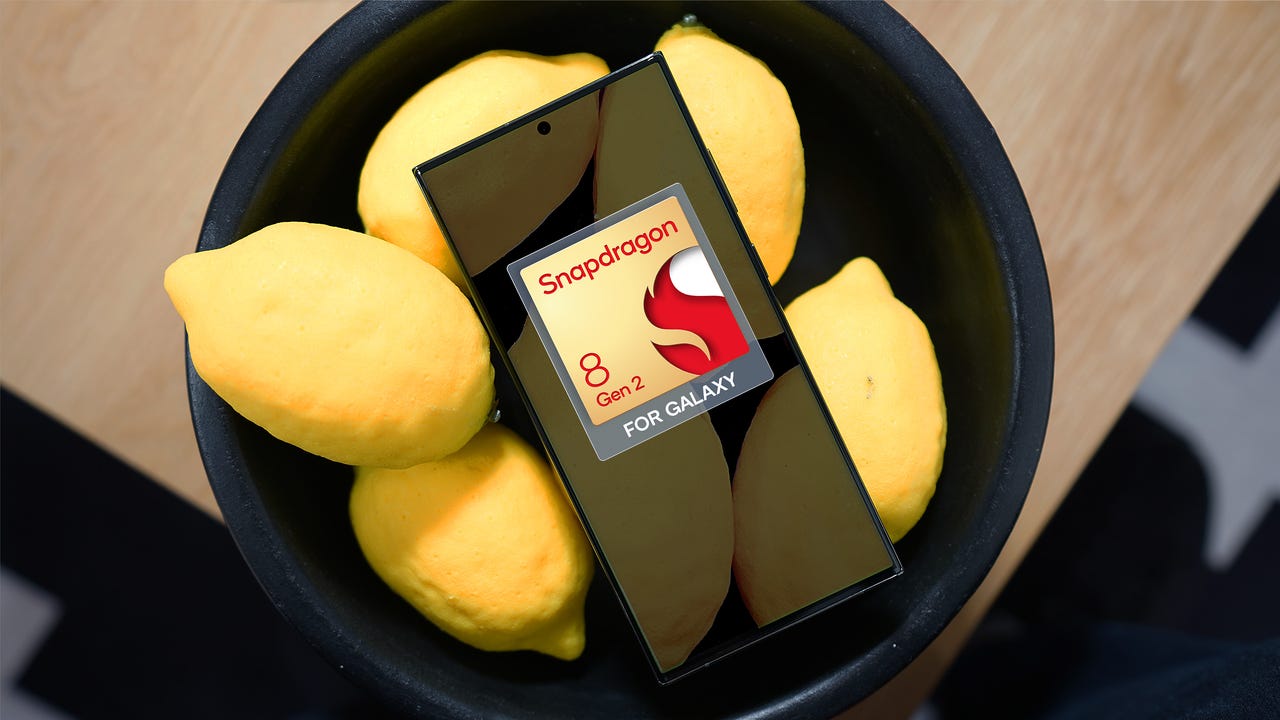































 Qualcomm and June Wan/
Qualcomm and June Wan/ It's Samsung Unpacked day, which means until the next big bad smartphone comes along, the Galaxy S23 series, led by theS23 Ultra , is now the cream of the crop, for speed and power. At least, that's what Samsung and Qualcomm are telling me.
All the latest innovations from Samsung, covered by 's product experts.
Read nowThe two companies extended a strategic partnership in July 2022, pledging Snapdragon-powered Galaxy devices for the next seven years.
For Samsung, it seems the partnership has already come to fruition, with the just-announced Galaxy S23 series getting exclusive dibs on a custom system on a chip (SoC), the Qualcomm Snapdragon 8 Gen 2 for Galaxy. The new chip is coming to every Galaxy S23 model, including ones in Europe.
Also: Everything announced at Samsung Unpacked 2023
So, what exactly is the Qualcomm Snapdragon 8 Gen 2 for Galaxy chip? How is it any different from the standard SoC? Is Samsung doing away with Exynos chips? I've answered all of those questions and more below.
"Qualcomm Snapdragon 8 Gen Mobile Platform for Galaxy" rolls right off the tongue, doesn't it?
The new "for Galaxy" variant offers the same AI and feature enhancements as the standard 8 Gen 2 chip introduced back in November, including FastConnect 7800 for Wi-Fi 7 support (when available), hardware-accelerated ray-tracing in games, a GPU and NPU that's up to 40% and 49%, respectfully, faster and more optimized than last year's S22, and more. CPU performance also gets a 30% bump.
Also: Best Samsung phones of 2023
On top of that, the new SoC introduces Snapdragon's Cognitive ISP to enable Semantic Segmentation, a real-time processing technology that distinguishes the various elements your camera captures, optimizing images and videos as you snap them. Imagine your phone being able to detect when a subject is wearing glasses and to automatically remove any glare that could be reflected from it in the final image.
The Galaxy S23 is the first smartphone to go live with this Snapdragon feature.
The biggest difference between the "for Galaxy" variant of the Snapdragon 8 Gen 2 chip is its accelerated CPU and GPU performance. On the Galaxy S23, the prime Kryo CPU core has been overclocked to 3.36GHz (compared with the original's 3.2GHz) while the Adreno GPU ramps up to 719MHz from 680MHz.
While these numbers should yield faster and more powerful performance out of the new Galaxy handsets, they'll also be the ones to blame if there are any overheating issues or excessive battery drainage once we go hands-on with the devices.
Also: Apple is reportedly phasing out Broadcom and Qualcomm chips
I reached out to Samsung with this concern and was given the following response: "The NPU [on the Galaxy S23] is optimized by more than 40% to balance performance and power. And the optimized chipset has contributed to the Galaxy S23 series' improved battery performance, increasing its overall power efficiency."
We'll have to see if the flagship lives up to Samsung's claims in the upcoming full review.
With the new chipset, I'm seeing all-around improvements to the Galaxy S23's performance, particularly in gaming. Thanks to the accelerated GPU, the Galaxy S23 is now capable of real-time ray-tracing, can produce lifelike, human-based characters via Unreal Engine 5 Metahumans Framework, and can process effects like bloom, depth of field, and motion blur more efficiently.
Every single one of those enhancements is meaningful and a step in the right direction for mobile gaming, especially with more companies branching into cloud-based gameplay.
While the European Galaxy devices have traditionally operated on Samsung's own Exynos chipsets, this year's Snapdragon 8 Gen 2 for Galaxy will debut globally, including in Europe. That means users can expect consistent performance across different regions.
As for Samsung's Exynos SoC, it doesn't look like the company is completely abandoning it just yet.
While the chipset is optimized for Galaxy devices and Samsung has played a role in manufacturing past Snapdragon SoCs (888 and 8 Gen 1), Qualcomm has confirmed with that the Snapdragon 8 Gen 2 for Galaxy is made by Taiwanese semiconductor company TSMC.
Also: Apple debuts M2 Pro and M2 Max, powering the year's best Macs
That's very good news, considering the manufacturer is also responsible for Apple's A Bionic chips, which have proven to be some of the most power-efficient silicon on the market.
 Etiquetas calientes:
tecnología
Nuestro proceso
Los teléfonos inteligentes
Etiquetas calientes:
tecnología
Nuestro proceso
Los teléfonos inteligentes